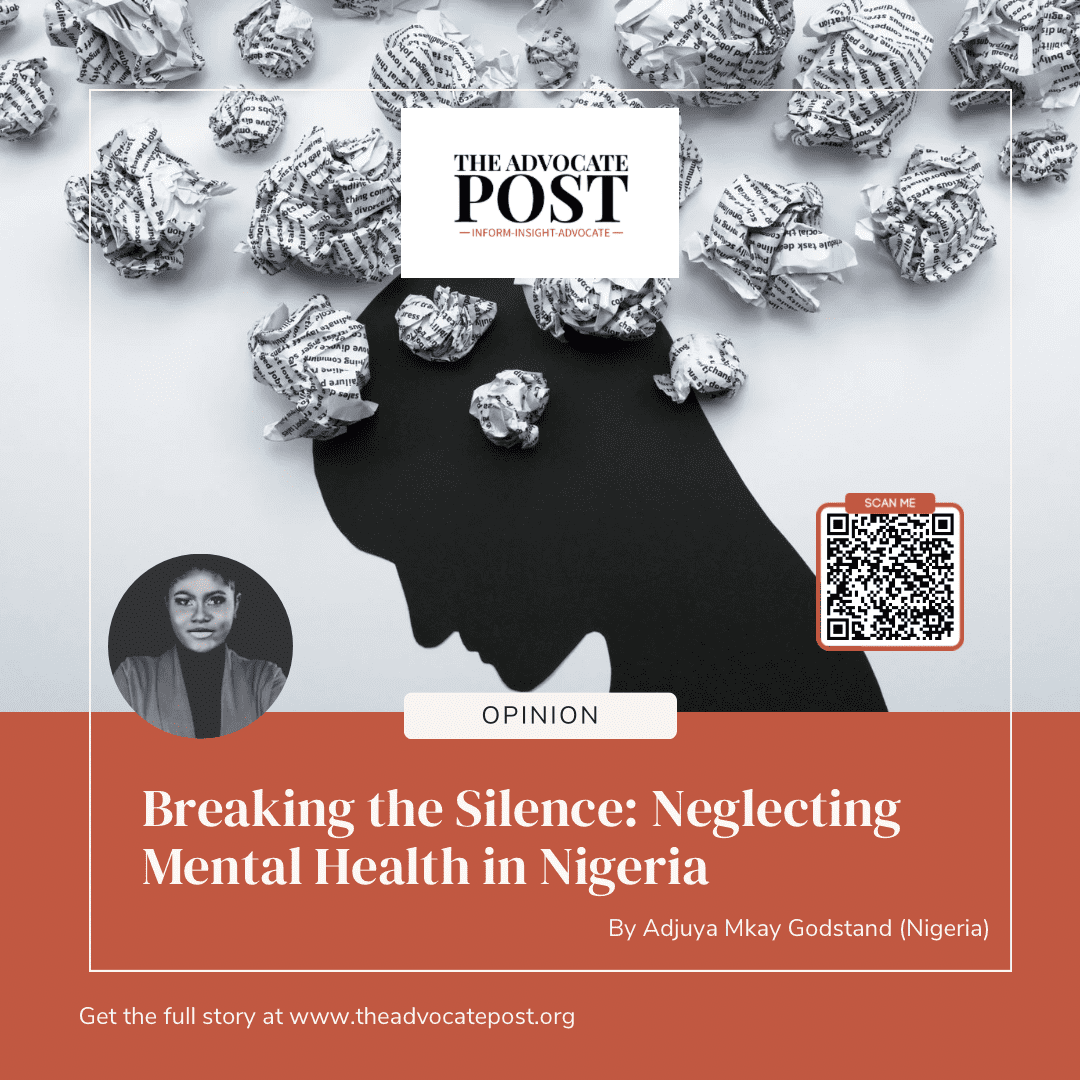By Adjuya Mkay Godstand (Nigeria)
Over the years, the delivery of Nigeria’s healthcare system has significantly improved in diverse health challenges except for one aspect- ‘Mental Health’. The disparity between other healthcare delivery and mental health services is palpable.
According to the definition of WHO “mental health is; a state of well-being in which the individual realizes his or her abilities, can cope with the normal stresses of life, can work productively and fruitfully, and can contribute to his or her community”
Just like other countries, Nigeria is under multiple health challenges like social and health worker burnout, insecurity, communal violence, and suicidal episodes which can lead the way to mental health issues. Thus, the need to bring awareness to the negligence and unavailability of mental health services in Nigeria.
The current state of Mental Health in Nigeria
The below listings portray and explain the current state of mental health services in Nigeria
-
Unavailability of mental health Services in the Primary and Secondary Health Centres(PHC)
In Nigeria, the healthcare sector is divided into three tiers; The tertiary, which includes; Federal Medical Centers, and specialist hospitals which are run by the Federal Government. The secondary healthcare sector includes; General hospitals run by the state government. The Primary Health Sector, which includes; Primary Health Centers and Clinics run by the Local Government with assistance from the state government and international donors.
In the Primary Health Sectors, the provision of mental health services is unavailable. They are also not available in secondary health centers. Cases within these territories are taken to the federal level where scarcity of infractures, professionals, and services are also problems. In addition to the unavailability of mental health services at the primary and secondary healthcare levels, there is also the case of poor mental health awareness.
-
Fewer mental health workforce
The professionals in charge of mental health are known as psychiatrists. They can be assisted by nurses, social workers, and auxiliary staff who are mental health certified. The problem is that most psychiatrists in Nigeria are found in tertiary healthcare centers. Furthermore, mental health professionals are fewer than 300 in the whole of Nigeria and has a population of over 190 million. Comparing the number of populations to the present number of mental health professionals, there is a ratio of 1: 700,000.
In addition to the inadequate workforce, most mental health professionals prefer to work outside of Nigeria as there are only a few available in the country. It is recorded that there are only eight neuropsychiatric hospitals that manage patients with psychiatric disorders in the entire country.
-
Mental health policy and legislature
In Nigeria, the laws and policies governing mental health are unstable and rigid. The Lunacy Act of 1958 ordinance, a mental health legislation, which was enacted in 1916 has not been amended since it was enacted. This law provides magistrates and medical practitioners the power to detain a person suffering from mental illness.
Furthermore, In the year 2019, a public hearing was held by the Nigerian Senate on the Mental and Substance Abuse Bill. This bill was aimed to strengthen the budget, allocations, and services for mental health and substance abuse disorders. Till today, the bill hasn’t been passed or signed.
However, some organizations like the Mental Health Foundation, and Neem Foundation, she writes about women and others have stepped up to fill in the gaps for the government with the assistance of awareness to improve the quality of life of mental health patients.
-
Mental health finances
The issue of mental health finances has led to thousands of people being at the mercy of their mental health. Due to the high cost of mental health treatment in specialized hospitals, people seek other alternatives which may end up futile.
This situation is a result of the allocation of about 3.3% to 4% of the mental health budget by the central government.
Recommendations for mental Health Service improvement.
For a more effective approach to abate the negligence of mental health services in Nigeria, below are some suggestions.
-
Integration of mental health services in primary health centers.
The primary health center is the first point of healthcare contact especially in the rural settlements. Integration of mental health services into the primary health sector will improve affordability, cost-effectiveness, accessibility, and preservation of Human rights. This strategy can also pioneer the posting of mental health professionals and personnel in training.
-
Reformation of mental health legislation and policies.
The existing policies and laws governing mental health services in Nigeria are rigid and outdated. For a better reformation of mental health services in Nigeria, the laws governing it should undergo refurbishment and reformation. New legislation should be put in place to ensure ever-growing and improving mental health services in Nigeria.
-
Development of Mental Health Research.
Recently, there has been no updated research or information on the level of mental health services in Nigeria. Moreso, the current ones are very hard to access. This situation has led to the neglect of mental health in Nigeria. To tame the problem, Government and NGOs on research should invest more in current trends, and unmet needs for mental health Services to help make better policies. This focus will also help improve the national survey on mental health matters.
-
Mental Health Awareness and enlightenment
The government has put so much effort into making the awareness of mental health go around. However, there is a need for collaboration between the government, professionals, NGOs, and international Agencies for more strategic and effective communication to the public. Public education and awareness campaigns should be targeted at violence victims, healthcare workers, military and law enforcement officers, prisoners, and minority groups like the homeless and social deviants, drug addicts and drug abusers, children/adolescents, and students.
Conclusion
Mental Health is an important part of public health that should not be neglected in Nigeria. Negligence in this aspect of public health has led to the unavailability of mental health services in PHCs, fewer workforce, poor policies, legislation, and mental health finances.
The Government, NGOs, international health Agencies, and other health-supporting bodies should combine working forces to improve the state of mental health in Nigeria. They could work on; the integration of mental health services in PHCs, restoration of law and policy governing mental health, development of mental health research, and more education and awareness on mental health. With all these recommended strategies in place, Nigeria’s mental health services will thrive.






This Post Has 2 Comments
Elle incarne le sérieux et l’éthique professionnelle
Pingback: Kenyan Professionals Power Somaliland's Progress: Over 8,000 Teachers and Skilled Workers Fuel Growth - The Advocate Post